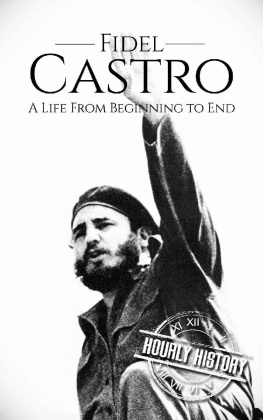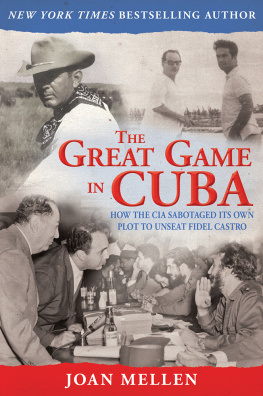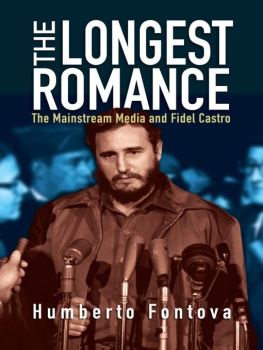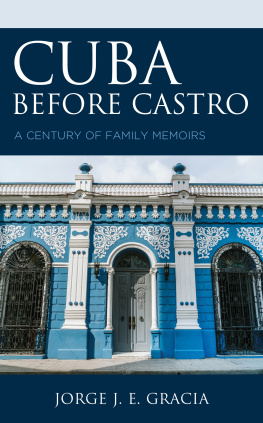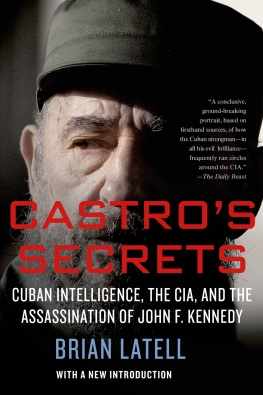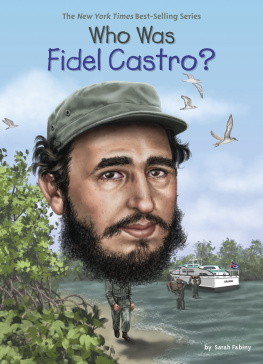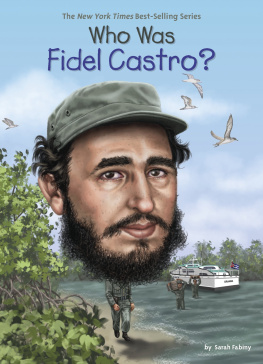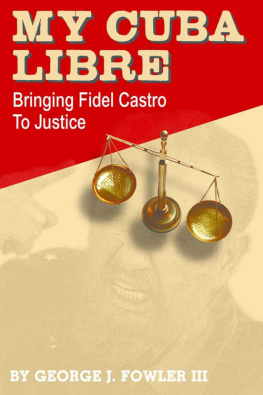
Escape from Cuba
Personal Accounts of Those Who Fled Castros Regime
Edited by ELOY L. NUEZ and ERNEST G. VENDRELL

McFarland & Company, Inc., Publishers
Jefferson, North Carolina
The editors of this book have pledged to donate 100 percent
of the royalties to the following charitable organizations:
Cuban Exile History Museum
Rotary International PolioPlus Campaign
St. Judes Children Hospital
Wounded Warriors
LIBRARY OF CONGRESS CATALOGUING DATA ARE AVAILABLE
BRITISH LIBRARY CATALOGUING DATA ARE AVAILABLE
e-ISBN: 978-1-4766-3656-6
LIBRARY OF CONGRESS Control Number 2019053925
2020 Eloy L. Nuez and Ernest G. Vandrell. All rights reserved
No part of this book may be reproduced or transmitted in any form or by any means, electronic or mechanical, including photocopying or recording, or by any information storage and retrieval system, without permission in writing from the publisher.
Front cover image 2020 Serge Geras/Shutterstock
McFarland & Company, Inc., Publishers
Box 611, Jefferson, North Carolina 28640
www.mcfarlandpub.com
Preface
Eloy L. Nuez
The darkness came over the island of Cuba on January 1, 1959. It is a darkness that persists to this day. It did not come suddenly or unexpectedly. As with all things evil, there were signs of what was to come. These signs were seen by a few, but were ignored by many others.
It should not have been a surprise to anyone. As with many calamities, events unfolded slowly at first, only to speed up at the end. Clearly, there were early signssome would recognize the horrors to come but feared to acknowledge their suspicions publicly. Anger, disgust, a sense of euphoria, and a great deal of wishful thinking clouded the judgment of many.
It must have been the same in Russia in the years leading up to 1917, the year the Bolsheviks took power. Or in the years leading up to January 1933when Adolf Hitler was appointed as Chancellor of Germany. In all these cases, the darkness crept in slowlyinnocuously at firstand gathered momentum. Fidel Castros rise to powerand Vladimir Lenins, and Adolf Hitlersall have much in common. All three historical events led to the death or misery of millions. All three started slowly and all three seemed unlikely to succeed. All three reached a critical point where history could haveand should havechanged forever, and the slaughter of millions of innocents may have been averted. But it was not.
The critical turning point for Lenin was when he returned from exile, years after being arrested for sedition in Czarist Russia. The critical point for Hitler came when he was pardoned and released from jail, after serving only nine months of a five-year prison term for attempting a coup dtat against the German government in 1923. Likewise, Fidel Castros rise to power may have been averted had he not been released years early from a 15-year term by then Cuban president Fulgencio Batista. Like Hitler and Lenin, Castro had been jailed for attempting to overthrow the government. All three had been unsuccessful in their first attempts. Lenin for encouraging insurrection. Hitler for his failed Beer Hall Putsch, and Castro for his unsuccessful raid on the Moncada Barracks in 1952. Against all odds, all three of these men survived violent insurrections, imprisonment, and/or exile. Yet all three would come back with a sense of vengeance to topple the governments that had shown mercy to them.
The similarities in the stories of Lenin, Hitler, and Castro makes one wonder what could have happened if these men had not been released from prison prematurely or allowed to come back from exile. It also makes one wonder how many other potential tyrants have been unsuccessful because they were either killed or neutralized in such a way as to render them incapable of overthrowing a sitting government. One also has to wonder if it had not been for Lenin, Hitler, and Castro, perhaps a Leon Trotsky, or a Rudolf Hess, or a Jos Antonio Echeverra could have taken their places. The identities of any of these lesser-known men could have come to historical prominence, had it not been for their unfortunate missteps. It is quite disconcerting to believe that for every successful despot in human history, there could well have been a thousand unsuccessful ones that we will never know about, or that became mere footnotes in history.
History is replete with stories of false messiahs and despots who rose to power by a mixture of personality traits, including charisma, egomaniacal tendencies, and a sociopathic disregard for the basic human rights of others. Thugs typically capture peoples admiration at first with charisma, and then hold their peoples loyalties with fear and terror. And in the cases of Lenin, Hitler, Pol Pot, Mao, and Fidel Castro, a great deal of good fortune also had to occur for them to ascend to their positions. But none of these men, or the tens of thousands that would have ostensibly taken their places, would have been successful had it not been for a compliant population that allowed them to come to power. All of these men started with a minuscule group of devoted followers. In every one of these cases, the vast majority of the population either didnt pay attention, or didnt care because nothing was happening to them personally and directly. Ignorance, apathy, indifference, and lack of moral courage among the general population are the ingredients that allowed these men to come to power and to lead their people to eventual ruin.
This book is not a history book. It is not about Fidel Castro. It is about the personal stories of individuals and their families. The backdrop of mass movements of refugees and the mass extermination of the people involved serves only as an historical context for these stories. This book is not about big history. It is about history at its most basic and granular level. Its about real people and how they survived and even thrived in the most difficult of situations.
This book tells the stories of the Cuban exile experience. It is told from the perspective of different writers. Some were young men and women at the time of the revolution. Others were just children. The stories take place in Cuba and in the United States. There are stories about those who risked everything and left their families and homes behind to seek freedom. There are also stories of those who stayed behind, with no other recourse but to adapt to the miseries of their new existence. There are stories about food rationing and forced labor camps as well as stories of false imprisonment and show trials whereby the guilt of the accused had been predetermined. There are stories about bearded thugs ransacking innocent peoples homes for no other reason than because they could. The authors relate stories about the fear of having a child say something in public that could get them arrested by the secret police, in addition to experiences of firing squads, betrayals of trust and neighbors turning against other neighbors to settle grudges or to deflect suspicion from themselves. The authors also discuss randomness, and how the slightest smile or laughter, or a song at the wrong time or the wrong place, could be perceived as an affront to the revolution and result in a radical change of ones life.
Above all, these stories are about the courage of a few who dared to stand up and fight against tyranny. They exemplify the resolve and resourcefulness of a Cuban exile community that has adapted and thrived in the United States and elsewhere. The stories feature successful exiles who have become doctors, lawyers, police officers, teachers, actors, community leaders, and U.S. congressmen and senators. The final words of these stories have yet to be written. It should not surprise anyone who reads this book if a child or grandchild of a Cuban exile were to become the president of the United States someday.
Next page

